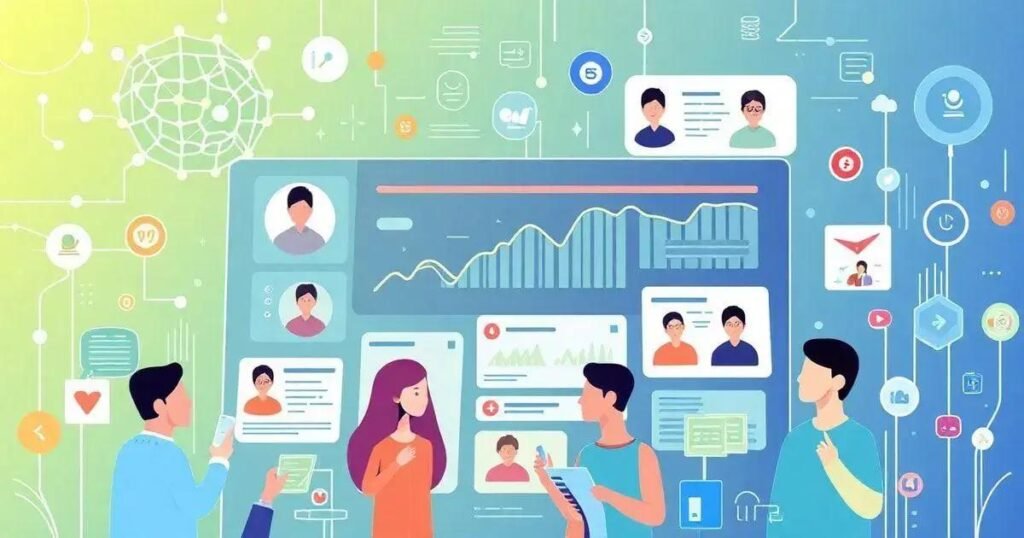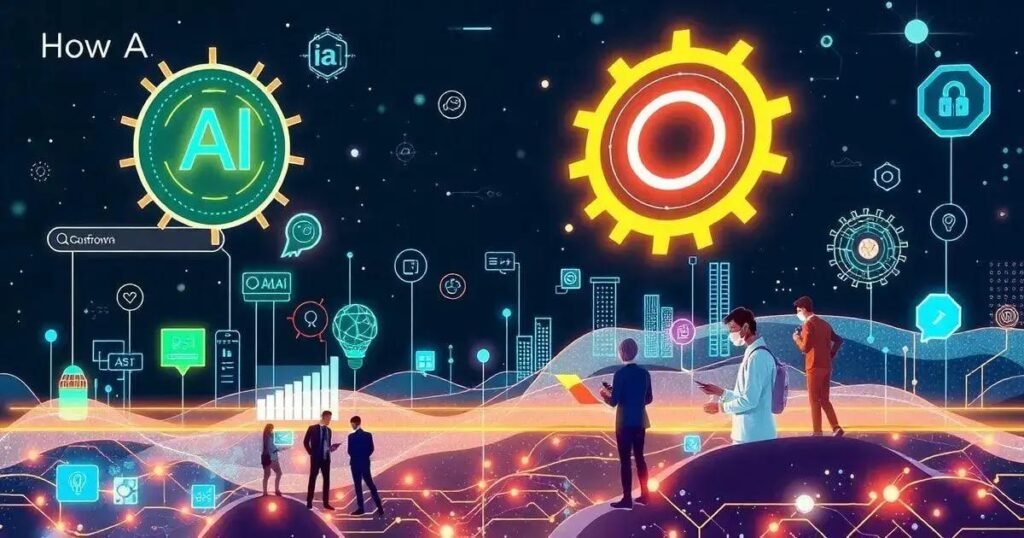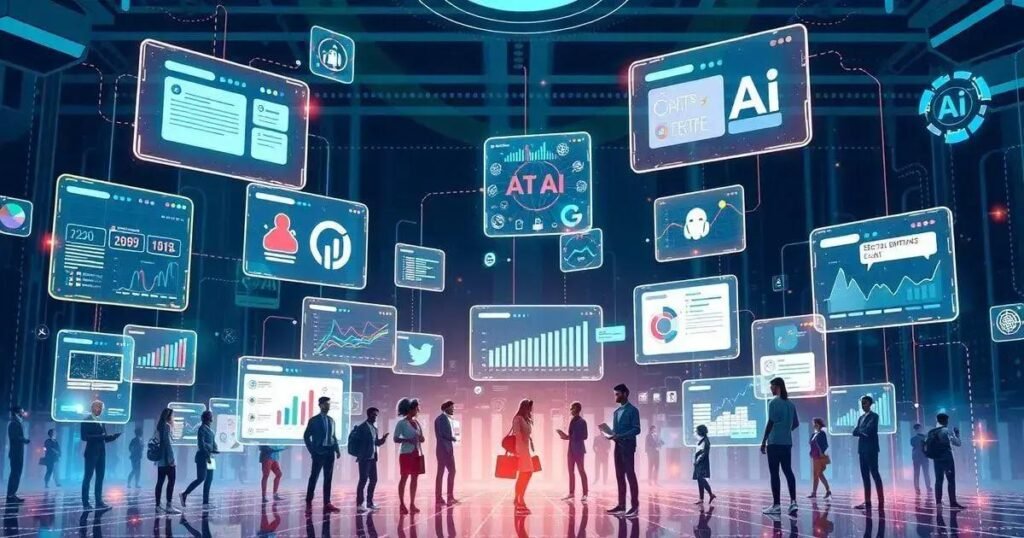Are you tired of throwing spaghetti at the wall when it comes to social media marketing? AI can help you streamline your efforts and achieve personalized results.
By harnessing the power of artificial intelligence, you can create content that resonates with your audience, optimize ad campaigns for maximum ROI, and gain valuable insights to inform your strategy.
In this post, we’ll explore the ways in which AI is transforming social media marketing and provide actionable tips for implementing AI in your own social media campaigns.
Achieving Personalization with AI-Powered Content
Achieving personalization with AI-powered content is crucial in today’s digital landscape. By leveraging AI-driven tools, businesses can create tailored content that resonates with their target audience. AI algorithms can analyze consumer behavior, preferences, and demographics to generate content that is both relevant and engaging. This approach not only enhances customer experience but also increases brand loyalty and drives conversions. For instance, AI-powered chatbots can assist customers in finding the most suitable products or services, leading to improved customer satisfaction and reduced support queries. By integrating AI-powered content into their marketing strategy, businesses can differentiate themselves from competitors and stay ahead of the curve.
Enhancing engagement with AI-driven insights is a game-changer for social media marketers. AI-powered tools can analyze vast amounts of data to identify trends, patterns, and correlations, providing valuable insights that inform content creation and campaign optimization. By leveraging AI-driven insights, marketers can create content that is more likely to resonate with their audience, track the performance of their content in real-time, and adjust their strategy accordingly. This approach not only increases engagement but also boosts conversions and drives business results. For instance, AI-powered analytics can help marketers identify the most engaging content formats, such as videos or infographics, and adjust their content strategy accordingly.
Maximizing ROI with AI-optimized ad campaigns is a key objective for businesses. AI-powered ad optimization algorithms can analyze vast amounts of data to identify the most effective ad formats, targeting options, and bidding strategies. By leveraging AI-optimized ad campaigns, businesses can improve ad performance, reduce waste, and increase conversions. For instance, AI-powered ad optimization can help businesses identify the most relevant audience segments, optimize ad creative, and adjust bidding strategies in real-time. This approach not only increases ROI but also improves customer experience and enhances brand reputation.
Understanding AI-powered social media algorithms is crucial for businesses looking to stay ahead of the competition. AI-powered algorithms analyze vast amounts of data to identify patterns, trends, and correlations, providing valuable insights that inform content creation and campaign optimization. By leveraging AI-powered social media algorithms, businesses can create content that is more likely to be discovered, shared, and engaged with. For instance, AI-powered algorithms can help businesses identify the most effective content formats, such as videos or live streams, and adjust their content strategy accordingly.
Best practices for implementing AI in social media require a comprehensive approach. Businesses should start by identifying areas where AI can add the most value, such as content creation, customer service, or data analysis. Next, they should develop a clear strategy for implementing AI, including setting goals, identifying key performance indicators, and allocating resources. Finally, they should monitor the performance of their AI-powered initiatives and adjust their strategy accordingly. By following these best practices, businesses can unlock the full potential of AI and drive business results.
Conclusion: the future of social media marketing is AI-powered. As AI technology continues to evolve, businesses will have access to more sophisticated tools and algorithms that can help them create personalized content, enhance engagement, maximize ROI, and stay ahead of the competition. By embracing AI-powered social media marketing, businesses can unlock new opportunities, drive growth, and stay ahead of the curve.
Enhancing Engagement with AI-Driven Insights
Enhancing engagement with AI-driven insights is a crucial aspect of social media marketing. By leveraging AI-powered analytics, businesses can gain valuable insights into consumer behavior, preferences, and demographics. This data can be used to create targeted content that resonates with the audience, increasing engagement and driving conversions. For instance, AI-driven insights can help businesses identify the most effective content formats, such as videos or infographics, and allocate resources accordingly. Additionally, AI-powered chatbots can assist customers in finding the most suitable products or services, leading to improved customer satisfaction and reduced support queries.
Maximizing ROI with AI-optimized ad campaigns requires a data-driven approach. AI-powered algorithms can analyze vast amounts of data to identify the most effective ad formats, targeting options, and bidding strategies. By leveraging AI-optimized ad campaigns, businesses can improve ad performance, reduce waste, and increase conversions. For instance, AI-powered ad optimization can help businesses identify the most relevant audience segments, optimize ad creative, and adjust bidding strategies in real-time. This approach not only increases ROI but also improves customer experience and enhances brand reputation.
Understanding AI-powered social media algorithms is crucial for businesses looking to stay ahead of the competition. AI-powered algorithms analyze vast amounts of data to identify patterns, trends, and correlations, providing valuable insights that inform content creation and campaign optimization. By leveraging AI-powered social media algorithms, businesses can create content that is more likely to be discovered, shared, and engaged with. For instance, AI-powered algorithms can help businesses identify the most effective content formats, such as videos or live streams, and adjust their content strategy accordingly.
Besides being a powerful tool for social media marketing, AI can also improve customer service, data analysis, and content creation. By identifying areas where AI can add the most value, businesses can develop a clear strategy for implementing AI and achieving their goals. For instance, AI-powered chatbots can assist customers in finding the most suitable products or services, leading to improved customer satisfaction and reduced support queries. Additionally, AI-powered data analysis can help businesses identify trends and patterns, making data-driven decisions a reality.
Maximizing ROI with AI-Optimized Ad Campaigns
Maximizing ROI with AI-optimized ad campaigns requires a data-driven approach. By leveraging AI-powered algorithms, businesses can analyze vast amounts of data to identify the most effective ad formats, targeting options, and bidding strategies.
AI-optimized ad campaigns can improve ad performance, reduce waste, and increase conversions. For instance, AI-powered ad optimization can help businesses identify the most relevant audience segments, optimize ad creative, and adjust bidding strategies in real-time.
Benefits of AI-Optimized Campaigns
This approach not only increases ROI but also improves customer experience and enhances brand reputation. By integrating AI-powered ad optimization into their marketing strategy, businesses can achieve significant returns on investment and stay ahead of the competition.
Understanding AI-Powered Social Media Algorithms
Understanding AI-powered social media algorithms is crucial for businesses looking to stay ahead of the competition. These algorithms analyze vast amounts of data to identify patterns, trends, and correlations, providing valuable insights that inform content creation and campaign optimization.
By leveraging AI-powered social media algorithms, businesses can create content that is more likely to be discovered, shared, and engaged with. For instance, AI-powered algorithms can help businesses identify the most effective content formats, such as videos or live streams, and adjust their content strategy accordingly.
Additionally, AI-powered social media algorithms can help businesses detect and prevent online fraud, ensuring the integrity of their social media campaigns.
Best Practices for Implementing AI in Social Media
Best practices for implementing AI in social media involve a strategic approach that considers the unique needs and goals of each business. This includes identifying areas where AI can add the most value, such as content creation, customer service, or data analysis, and developing a clear plan for implementation.
Additionally, businesses should ensure they have the necessary resources, including data and computing power, to support AI-powered initiatives. Furthermore, AI implementation should be done gradually, starting with pilot projects to assess efficiency and iteratively refining the approach based on results.
By following these best practices, businesses can successfully integrate AI into their social media marketing strategy and achieve significant benefits.
Conclusion: AI’s Future in Social Media Marketing
Conteúdo não disponível
FAQ – Frequently Asked Questions about Artificial Intelligence in Small Business
How can task automation benefit my small business?
Task automation frees your team from repetitive tasks, increasing productivity and allowing them to focus on more strategic tasks.
What tools can I use for data analysis?
There are several tools available, such as Google Analytics, Tableau, and Microsoft Power BI, that help collect and interpret valuable data.
What are chatbots and how do they improve customer service?
Chatbots are virtual assistants that can answer questions and solve problems 24/7, improving customer experience and freeing up your team.
How can I personalize the customer experience?
Through data analysis, you can better understand customer preferences and offer personalized recommendations and promotions.
Why is customer feedback important?
Feedback is essential to identify areas for improvement and adjust your strategy to ensure customer satisfaction.
Is artificial intelligence accessible to small businesses?
Yes, there are many AI solutions that are accessible and scalable for small businesses to improve efficiency and customer service.




